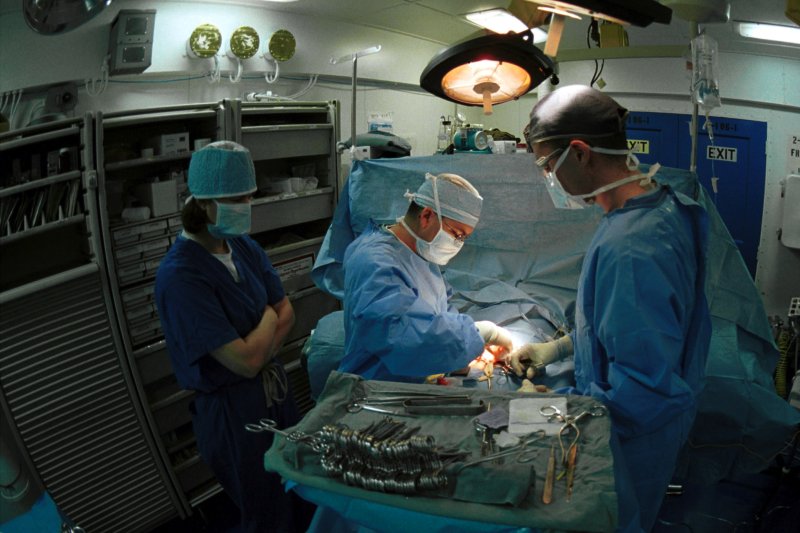1 of 2 | Medical personnel perform corrective hernia surgery aboard USS Carl Vinson on October 26, 2001. A study of mice found an age-related increase in estrogen can lead to form of hernia common that often requires corrective surgery. U.S. Navy photo by Jeff Stanislawski |
License Photo
Oct. 16 (UPI) -- An age-related increase in estrogen may lead to a common form of hernia that often requires corrective surgery, according to a study of mice.
When researchers reduced estrogen with a drug compound, it prevented the inguinal hernias, offering promise of therapy with preventive potential in humans. The findings were published Monday in the Proceedings of the National Academy of Sciences journal.
"It may make sense to treat at-risk men with an aromatase inhibitor that could decrease estrogen and strengthen the muscle," said study leader Dr. Serdar Bulun, professor of obstetrics and gynecology at Northwestern University Feinberg School of Medicine, said in a press release.
Inguinal hernias, which are predominant in older men, occur when tissue, including in the intestines, protrudes through the inguinal canal, a weak spot near the groin in the abdominal wall.
Around 700,000 inguinal hernia surgeries are performed each year in the United States, according to the U.S. Food and Drug Administration. In all, there are 1 million hernia repairs each year.
The lifetime risk of inguinal hernia is 27 percent in men and 3 percent in women, according to a National Institutes of Health study.
As men age, a larger amount of testosterone is converted to estrogen by a hormone called aromatase.
The researchers found the lower abdominal muscles in mice are sensitive to estrogen and they develop scar tissue, which leads to weakening of abdominal wall and eventually inguinal hernias.
"We realized the lower abdominal muscle is extraordinarily sensitive to estrogen," Bulun said. "Estrogen causes these fibroblasts to divide rapidly, at a much higher pace than the muscle cells."
Bulun mainly investigates breast cancer and gynecology.
He was studying the effects of high estrogen in female mice, including the conversion from testosterone, and wasn't even interested in the male mice until an animal keeper at Northwestern spotted large hernias developing in only the males.
When he studied these mice, he found large amounts of fibroblasts -- scar tissue -- were developing in structure analogous to the inguinal canal in humans.
When the mice were given drug that blocked aromatase, the conversion of testosterone to estrogen stopped and the hernias subsided.
The researchers are planning clinical trials that would to test an aromatase inhibitor's effectiveness in human subjects.
Along with age or genetics, Bulun said the best predictor of a future inguinal hernia is a previous one.
"If you have to repair a hernia for the second time, the chances of success go down," Bulun said. "If there is a recurrent case, you might be able to supplement the surgical treatment of that patient with medication."















